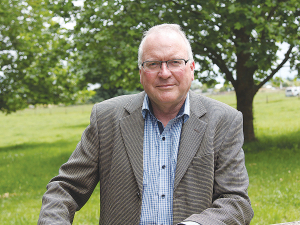M.I.A.
OPINION: The previous government spent too much during the Covid-19 pandemic, despite warnings from officials, according to a briefing released by the Treasury.
 Ruakura Technologies chief executive officer Dr Steve Hodgkinson claims the product is positioned to meet a market need for science-backed immune support.
Ruakura Technologies chief executive officer Dr Steve Hodgkinson claims the product is positioned to meet a market need for science-backed immune support.
Hamilton-based Ruakura Technologies is developing a dairy-based natural product that it says has the potential to offer immediate short-term immune support against the virus causing Covid-19 disease.
The eventual product is intended to safeguard people in high-risk situations including events, frontline work, or during mass transportation such as on trains or flights.
Still in the early stages of development, a technical breakthrough captured as a provisional patent filing, means the product is getting ready for on-farm pilot-scale production of the immune milk-based active ingredient using selected animals.
Chief executive officer Dr Steve Hodgkinson says the product is positioned to meet a market need for science-backed immune support, particularlyy relevant considering the current pandemic.
"Beyong vaccines, PPE and social distancing, there are few options available for people wanting to reduce their personal risk of contracting Covid-19. We are working towards a product that can provide science-backed immune support," says Hodgkinson.
The science mimics nature in much the same way that a mother's milk protects the newborn.
The recent breakthrough, made in collaboration the University of Waikato, has centred around the design of coronavirus antigens that induce antibodies in ruminant milk that block virus binding to the receptor that allows entry to human cells.
The product is intended for immediate, short-term protection, so users would take a productive dose when entering a high-risk situation and receive protection for 3-4 hours. The product is different to a vaccine, which is slower to act, but provides longer term protection.
Hodgkinson says the freedom that the product could provide consumers is exciting, especially with so many Kiwis currently facing alert level restrictions. With the proof-of-concept phase complete, the time to market for the final product, which will likely be taken as an oral supplement or nasal spray, should be relatively short.
Hodgkinson says the potential application of the technology extend well beyond the current pandemic, with opportunities to provide immune support against other pathogens, such as norovirus, which regularly sweeps through close-quartered environments like cruise ships and retirement villages.
Notably, the research has been self-funded to date via a loan from Callaghan Innovation. Hodgkinson says, "we are looking for funders and partners who can help us move into pilot-scale production and launch a product next year".
OPINION: The year has started positively for New Zealand dairy farmers and things are likely to get better.
Ministry for Primary Industries (MPI) Director General Ray Smith believes there is potential for an increase in dairy farming in New Zealand.
New Zealand's new Special Agricultural Trade Envoy, Horowhenua dairy farmer, company director and former Minister of Agriculture, Nathan Guy says the Free Trade Agreement (FTA) with India is a good deal for the country.
New figures show dairy farmers are not only holding on to their international workforce, but are also supporting those staff to step into higher-skilled roles on farm.
New tractor deliveries for 2025 jumped 10% compared to the previous year, a reflection of the positive primary sector outlook, according to the Tractor and Machinery Association (TAMA).
Entries have opened for two awards in the New Zealand Dairy Industry Awards (NZDIA) programme, aimed at helping young farmers progress to farm ownership.